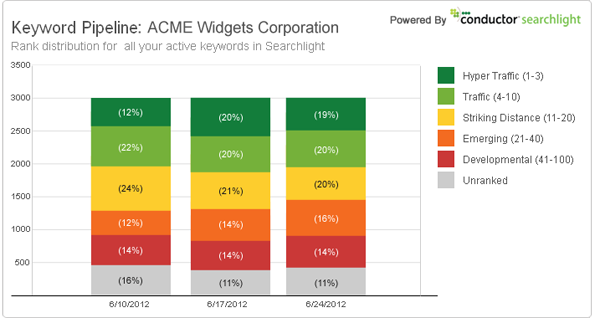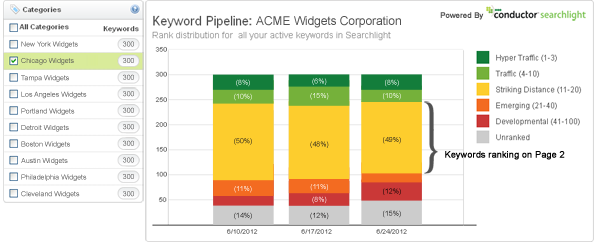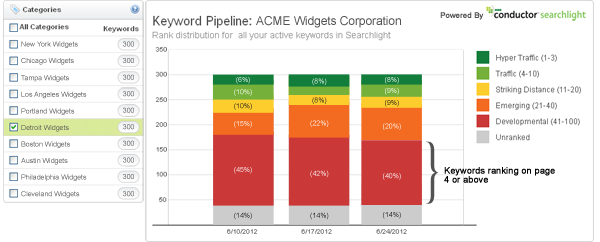Making The Case For Adding Keyword Segmentation To Your SEO Repertoire
Last month in The Forgotten SEO Strategy: Targeting Striking Distance Keywords we talked about how search professionals could approach their keyword strategy by targeting keywords based on their ranking position. Specifically, we showed how they can target striking distance keywords—keywords ranking on page 2—to obtain some quick traffic wins while simultaneously building link equity for […]
Last month in The Forgotten SEO Strategy: Targeting Striking Distance Keywords we talked about how search professionals could approach their keyword strategy by targeting keywords based on their ranking position.
Specifically, we showed how they can target striking distance keywords—keywords ranking on page 2—to obtain some quick traffic wins while simultaneously building link equity for longer term targets.
This month, I want to advance the conversation and dive deeper into the topic, by providing specific examples of how keyword segmentation can provide insight that will shape your SEO strategy.
We’ll look at one specific way of segmenting keywords–by geography—and the insight it can bring, but of course there are many different ways of analyzing and segmenting keywords to gain insight from your keyword set.
Hopefully by the time we are done, if you have been thinking about advancing the way you do SEO to include keyword segmentation, you will have decided to do so.
Broad View Of Keywords Hides Insight
Let’s say Acme Widget Co. is a widget making company that sells their widgets in cities all over the United States. They recently decided to become serious about natural search as a traffic and sales channel and began tracking core keywords’ search rankings.
They also began to take a more serious look at their web analytics to determine where their search traffic is coming from.
After some analysis, they noticed they were getting traffic from searchers looking for Acme’s widgets by geographic region (e.g. ‘Chicago widgets, ‘buy widgets in Chicago’…). When they aggregated the keywords by search ranking position, no discernible trends jumped out:
(Note: The segmentation shown is via Conductor’s Searchlight enterprise SEO platform, [disclaimer: I work for Conductor] but similar segmentation could be done with a bit of focused effort via a rank tracker and some fancy Excel footwork.)
Next, they segmented keywords into geographic regions and again, aggregated rank data by ranking position.
Now, several obvious trends emerged in several regions. In Chicago, for example, they noticed a disproportionate percentage of keywords ranking in prime striking distance position—on page 2 of the search listings.
In Detroit, a large percentage of keywords were in the ‘Developmental’ visibility zone, ranking on page 4 or higher:
Further research showed that Acme’s standing in the search listings varied widely by region because the competitive landscape differs from one region to another.
For example, they found there were many more local widget retailers vying for the same search listings in Detroit than in Chicago. And, their own regional link graph, region specific content, and anchor text strategy will also impact visibility from one region to the next.
The most important result of the segmentation Acme did was helping them build a region specific go-forward plan as they developed strategies appropriate for their visibility in each region.
For example, in Chicago they developed a plan to grab the low-hanging fruit from the large number of keywords on page 2 while in Detroit they built a long-term plan to develop and seed content to start moving low ranking keywords up the search listings.
Keyword Segmentation Can Reveal Valuable Insight
Our example focuses on keyword segmentation by geography, but segmentation within your analytics can provide similar insight in other scenarios such as branded vs. non-branded keywords, by product line, or by any other segment that makes sense in your vertical or individual business.
Acme took a valuable lesson away from the exercise: While a broad view of your natural search visibility is important in your SEO practice, it can easily hide trends within unique keyword segments.
Contributing authors are invited to create content for Search Engine Land and are chosen for their expertise and contribution to the search community. Our contributors work under the oversight of the editorial staff and contributions are checked for quality and relevance to our readers. The opinions they express are their own.
Related stories
New on Search Engine Land


